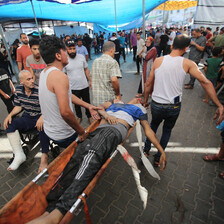The Electronic Intifada 3 July 2024

Shujaiya, an area of Gaza City, has been repeatedly invaded by Israel in recent months.
EFE via ZUMA PressMy family and I have now been displaced nine times since the genocidal war on Gaza began.
In May, our home in Jabaliya refugee camp was destroyed during an Israeli invasion. As a result, we went to stay in the Shujaiya neighborhood of Gaza City.
We took shelter in the home of relatives. And before long, Israel attacked the area.
The attack occurred while I and my new neighbors were collecting wood near Gaza’s boundary with Israel.
Suddenly, we found ourselves being showered with shells. We were shocked to see a large number of tanks approaching us.
Next we heard a series of explosions shaking the entire neighborhood.
We remained where we had been collecting wood for about 20 minutes. Then we left the wood behind us and – moving between the trees – slipped back to Shujaiya as the shells rained down all around us.
On the way back, we saw buildings collapsing with their inhabitants still inside them. Other people managed to flee.
A girl walking barefoot with a bag on her back was crying in the street. When I asked her why she was crying, she said that all of her family had been killed.
I was speechless.
When I arrived at our relatives’ house, I found my family waiting for me so that we could leave the neighborhood.
We left it on foot, carrying just one bag.
We brought our personal documents. But we left our blankets, mattresses, clothes and bags of flour behind.
And we fled as Israel attacked the area with shells from tanks and by firing missiles from the warplanes flying overhead.
Exhausted
Horrific scenes are not new to us. But you cannot become accustomed to them.
They haunt you even while you sleep.
I praise God that we survived the latest invasion of Shujaiya. How many more invasions can we survive?
We are exhausted by being constantly uprooted.
We fled Shujaiya with nothing to eat. And we returned to Jabaliya, setting up a tent on the rubble of our home.
We have decided to live here until some of the rooms in our house are rebuilt.
We were very sad to leave Shujaiya as we had developed a sense of camaraderie with its people.
When we arrived in Shujaiya, it was in ruins. There had been two previous invasions during the current war.
Its landmarks – including the local market – had completely disappeared.
The market was well-known among people from across Gaza. It often sold goods at low prices and had a number of traditional restaurants.
Shujaiya’s houses were not really fit for human habitation any more. But quite a few residents of Shujaiya preferred to stay in what remained of their homes than take shelter in packed schools or makeshift tents.
Many others had moved southwards and allowed families like mine to stay in their wrecked homes.
With the wells in the area destroyed, the owner of a desalination plant helped us and neighbors in Shujaiya to get some water every day. Every morning, he would arrive in a truck from which we could fill our jugs and buckets with water.
Others hauled barrels they had just filled with water onto animal-drawn carts.
People in Shujaiya were generous. They provided food, clothes, blankets and other essentials to families who came to the neighborhood after being forced from their homes.
Flour was among the few items of food available. Women would use it to make pastries and cookies over wood fires.
Men would sometimes gather leaves from cherry trees which are in bloom right now. And so we would have stuffed cherry leaves.
Charities often delivered simple meals – based on spaghetti, rice or peas – to the neighborhood.
We did our best to entertain ourselves. I would sit with friends and chat while brewing tea with salty water.
Young people held football games on the bulldozed streets. Children played hide and seek among the wreckage of damaged buildings.
Kites were flown even though there were drones and other warplanes in the sky.
Sometimes, we helped people from Shujaiya to rebuild a room in their destroyed or damaged homes.
When will this genocidal war end?
I am afraid it will continue for a long time, that powerful governments will not put any real pressure on Israel to halt it.
Osama Abu Jaser is a writer based in Gaza.





